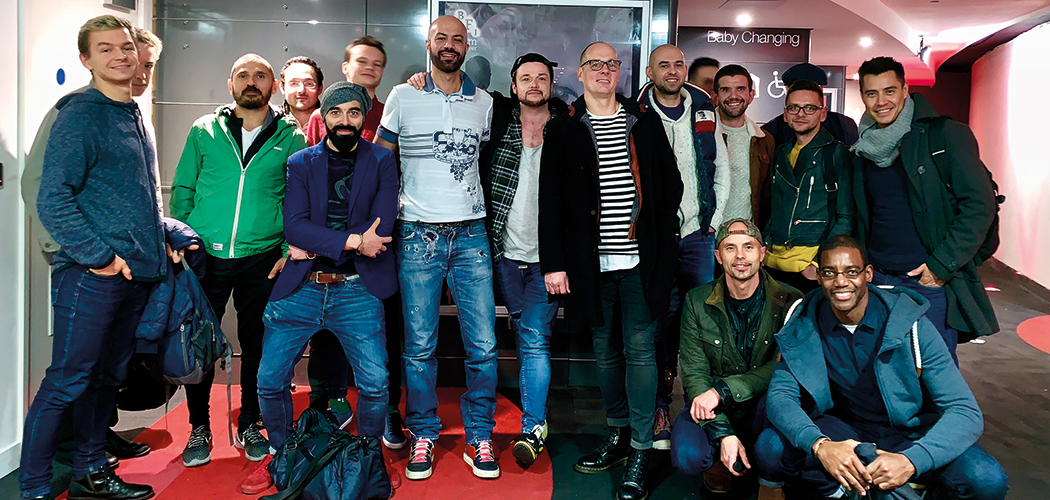Alcohol-free? David Hudson explores London’s emerging, underground, sober LGBTQ social scene.

There are many reasons why gay people tend to drink more and party harder than their heterosexual peers. Sometimes it’s a response to depression or stress. Other times it’s related to internalized homophobia: the need to have a few drinks to be comfortable in one’s own skin – or to get intimate with someone else.
Whatever the reason, study after study has found that gay men tend to drink too much. However, we all know the dangers linked to drinking, and there are signs things might be changing.
Unlike in the past, gay people are less likely to meet potential partners out in a scene venue. And across the UK population as a whole, we’re beginning to drink less. According to the Office of National Statistics, the number of non-drinkers aged between 16-24 rose from 19% in 2005 to 22% in 2017. Millennials and Gen Z’ers are less likely to frequent bars.
So, how is the scene responding? And if you stop drinking – whether permanently or just for ‘Sober October’ or ‘Dry January’, can you still have fun? Attending an LGBTQ+ sober mixer at new venue Colours Hoxton, alcohol seems to be a non-factor. In fact, I’m not sure that anyone attending is even there because of the alcohol-free aspect.
Each month, the venue hosts a Drag Lab event. It’s basically a drag workshop for those wanting to find out more about make up and drag. There were around 15 people on the evening I visited: a mixture of men and women.
Drag queen, The Nightbus chooses a willing volunteer, Ahuv, and gives him an impressive step-by-step makeover. Afterward, Ahuv tells me he attended because of the drag angle, but he was happy not to drink. He doesn’t see it as a prerequisite to a good night out.
Anna Milward, who oversees the venue’s arts and culture events says Colours Hoxton is determined to offer a diverse range of attractions.
“Not everyone wants to drink when they go out – whether it’s for health, religious or any other reason – so we felt it was really important to create a safe and sober space for people to mix and mingle.”
“It can be really nerve-wracking going to an event on your own, but the great thing about a sober event is that everyone is in the same boat! The whole point of a sober mixer is to have fun without alcohol, so we programme activities – whether it’s watching a film in onesies, tarot workshops or learning the art of drag make-up – to encourage people to just get stuck in without any awkward ice-breakers.”
Of a similar bent is Queers Without Beers. This Meetup group runs monthly social events in London and Manchester. I attended for an evening at Bethnal Green’s hip new Fugitive Motel.
They make sure they host the event somewhere that offers a large variety of alcohol-free options, and I enjoyed a cucumber and mint kombucha while talking with others. Inevitably, some of the conversation revolves around what brought people to the group. One man is on a 100-day challenge to not drink. Another is in a 12-step programme. Both welcome the option of a sober social.
The club was co-founded three years ago by Laura Willoughby, MBE. She runs Club Soda, an organisation to help people change their drinking habits.
“Most of us don’t fit into one box or another when it comes to drinking, but most of us would like to cut down,” Laura tells me. “We don’t believe there are definite lines between the type of drinker you are and the type of drinking you would like to be. We just wanted to provide a space where people can socialise without feeling the pressure to drink … and try some amazing drinks!”
Laura acknowledges that many people when considering whether to drink or not, fear whether they will still enjoy themselves on the scene.
“You can be just as social as you were as you moderate your drinking or go alcohol-free. In the beginning, when you’re trying to change your drinking habits, things will be a little different, and you may feel more awkward, but it won’t be forever.”
She recommends people plan ahead and work out what they want to drink, saying many pubs and bars have changed a great deal. Although this is one area where gay venues “need to really step up their game.”
“You don’t have to stay at home if you’re not drinking. You deserve to have a really good drink served really well in a really nice venue.”
The newest kid on the sober block is Misery, an occasional party launched earlier this year. Its aim is to provide a supportive, sober club space aimed primarily at LGBTQ+ people of colour – one that nurtures mental health and wellbeing. It features DJs and dancing, but also ‘tactile play corners’, offering massage and genderless nail-painting.
“People tend to associate nightlife, that letting go and freedom, with being fucked in one way or another,” promoter Aisha Mirza tells me. “We thought let’s try and create a space where people can access joy and healing and freedom and family, and all the things that our community needs but maybe without alcohol or certain substances.”
The night is going from strength to strength (although Aisha admits finding venues for a Friday or Saturday night that are happy to host alcohol-free events is challenging).
But what of the name, Misery? “That was a little bit of a joke because I think there is a lot of pressure to be strong and be quite fabulous,” says Aisha. “And we are strong and fabulous, don’t get me wrong, but I just wanted to create an alternative mode of being, in queer culture.
“Some of us are dealing with rejection, isolation, and marginalisation, so I wanted to create an option where you can also feel sad and that’s valid. Let’s talk about depression. Let’s convene around that and have a party around that: because you can!”
Other groups are also understanding the appeal of alcohol-free options. Will You Be There Darling? (pictured) is one of gay London’s biggest Meetup groups, with 5,800+ members and dozens of monthly events. Many of these are club and bar focussed, but they also include theatre, museum and art trips.
“We pride ourselves in being the ‘non-judgemental’ Meetup group,” says promoter Michael R. “And that covers both sides of the drinking spectrum: from totally sober all the way to functioning alcoholic. As long as our members are respectful to one another at all times everyone is invited to join our Meetup events.”
I quit drinking a few years ago. I personally found it essential to find some friends who don’t drink (whether because they were similarly tee-total or driving). I also don’t stay out at venues for as long as I used to, and it’s a bonus if there’s some entertainment or cabaret to hold my interest.
Thankfully, because of these grassroots groups, the options are increasing. And, as Laura says, much of the scene still needs to catch up. Lots of people now don’t drink – but we still want to go out and have a choice of what to consume and where to go.
Sober LGBTQ socialising out in London
Colours Hoxton
This new bar hosts a monthly LGBTQ+ sober mixer. More details at colourshoxton.com
CYOA
‘A sober queer & LGBT dance party’ that has been running for past six years. The next one takes place 30 November in Peckham – check out @cyoa_ldn on Twitter.
The Gay Sober Group
A social group for gay men who are sober and do not use drugs. meetup.com/The-Gay-Sober
Misery
Occasional sober party and mental health safe space aimed primarily at queer and trans people of colour. Check @miseryparty on Instagram for more info.
Queers without Beers
Check out the Queers-Without-Beers group on Meetup.com for full details of upcoming events. Clubsoda.com also has listings of bars in London that offer the widest range of alcohol-free options.
Will You Be There Darling?
Probably London’s biggest MeetUp group for gay men looking to make new friends and for socializing opportunities, with several events not in bars. More details at meetup.com/WYBTD-Will-You-Be-There-Darling














